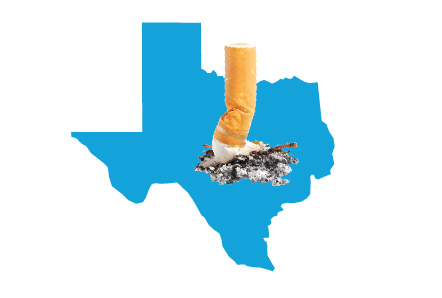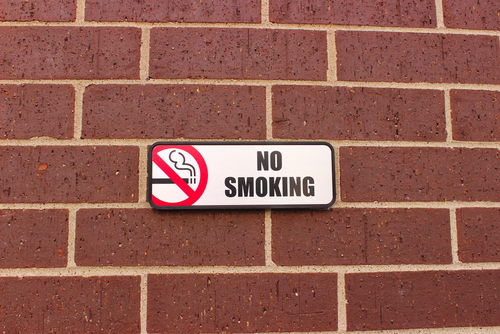American adults with mental illnesses smoked about a third of the 264 billion cigarettes sold in 2015, according to a recent report. For Texas’ behavioral health treatment organizations, this was a rally cry. To move the needle, the state created Taking Texas Tobacco Free (TTTF) to help local mental health authorities reverse this grim trend affecting one of the state’s most vulnerable populations.
With funding from the Cancer Prevention Research Institute of Texas, project directors Lorraine Reitzel, Cho Lam and Bill Wilson guided 18 mental health authorities (later joined by a nineteenth) through a new initiative to become 100 percent tobacco-free.
Designing the Blueprint for Success
Nobody saw TTTF as a “quick fix.” Program roll-out spanned 36 months with three distinct phases: (1) planning, (2) implementation and intervention and (3) sustainability and outreach. Program implementation adopted a multi-tiered approach to ensure success:
Activating Organizational Change
Based on the results of a readiness survey, TTTF selected 18 mental health authorities to begin the process of going tobacco-free. After an initial TTTF orientation to provide agencies with background information and set program expectations, individual meetings took place at each mental health authority where teams established agency-specific timelines and finalized agreements. The agencies’ leadership gained access to ongoing consultation and technical assistance, while agency staff utilized additional supporting materials such as nicotine replacement therapy starter kits and funding for tobacco-free campus signage. All levels of the agencies were engaged in the initiative to ensure widespread support and long-term sustainability.
Empowering & Educating Staff
Comprehensive training across all agency staff is critical to ensuring support and facilitating new norms about tobacco use and wellness. Across all TTTF agencies, TTTF staff provided 218 onsite trainings reached 4,696 staff, educating them on the effects of tobacco use generally and how it applies to the behavioral health population specifically. TTTF identified agency champions within each center to maintain staff enthusiasm and ensure program sustainability.
The agencies were encouraged to integrate tobacco use screenings into all their clinical encounters, which proved to be essential in keeping agencies on track even after the TTTF program ended. Across the entirety of the program, participating agencies recorded nearly 120,000 tobacco use screenings.’
Involving the Community
Outreach to local communities enabled the local mental health authorities to provide the leadership and guidance necessary to facilitate meaningful change that extends beyond their campuses, thereby changing the norms of the communities where their clients live and work. Agencies implemented campaigns comprised of widespread communication, training and education to highlight the issue of tobacco use and provide resources and referrals for cessation.
Measuring Success
Since initiating TTTF, more than 200 individual clinics from the selected local mental health authorities, which represent half the counties in Texas, adopted and enforced tobacco-free workplace policies — truly creating environments that support the whole health of both staff and clients.
As centers went tobacco-free and individuals became more aware of the effects of tobacco use, more people wanted to quit. Thus, the demand for nicotine replacement therapy skyrocketed in unanticipated quantities. Starter kits once thought to cover several months of the program were depleted within six to eight weeks.
Successes across the program include:
- All participating agencies went tobacco-free with minimal compliance issues.
- Increased tobacco use screenings and desire to quit.
- Nicotine replacement therapy adoption by clients and staff.
- 4,696 staff members received tobacco education training.
- Many agencies initiated quit tobacco groups.
- More than 70 clinical providers attended specialized nicotine replacement therapy prescriber training.
- More than 200 providers trained in motivational interviewing.
- 62 clinicians became certified tobacco treatment specialists.
- Thousands of staff members and clients protected from secondhand smoke.
TTTF is a model for other community mental health agencies to go tobacco-free and enhance the health and wellness of clients, staff and their communities. And perhaps TTTF’s most telling outcome is the receipt of another grant from the Cancer Prevention and Research Institute of Texas to extend the program to the remainder of interested local mental health authorities in Texas.

Tobacco Cessation FAQ Videos for Providers & Clients
The Taking Texas Tobacco Free (TTTF) initiative has helped over 18 community behavioral health organizations go tobacco free and provided over 10,00 Texans with efficacious cessation interventions. To spread their …

Taking Texas Tobacco Free – Tobacco Cessation Resources
[Updated February 20th, 2019] Taking Texas Tobacco Free is a community-academic collaboration between Integral Care, a community behavioral health center serving the Austin, Texas region, and the University of Houston. …

Live Tobacco-Free Austin
Communities Putting Prevention to Work (CPPW) is an initiative designed to make healthy living easier by promoting environmental changes at the local level. Through funding awarded by the CDC in …
